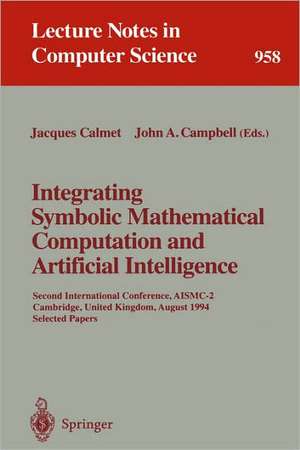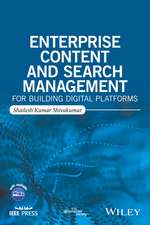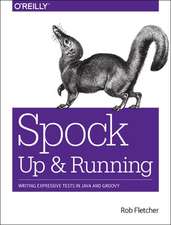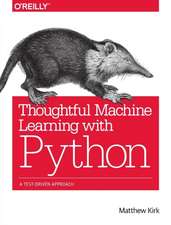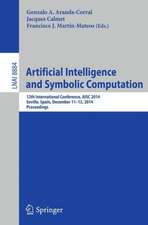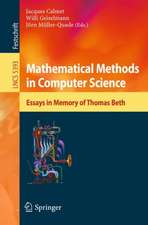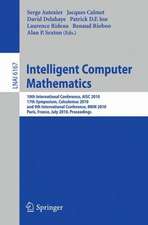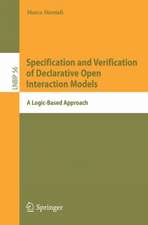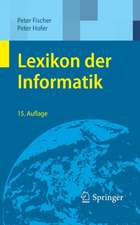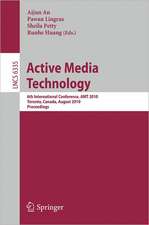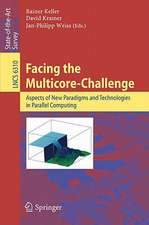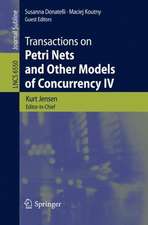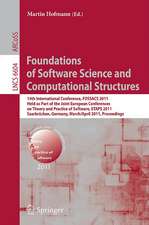Integrating Symbolic Mathematical Computation and Artificial Intelligence: Second International Conference, AISMC-2, Cambridge, United Kingdom, August 3-5, 1994. Selected Papers: Lecture Notes in Computer Science, cartea 958
Editat de Jacques Calmet, John A. Campbellen Limba Engleză Paperback – 10 aug 1995
The 19 papers included give clear evidence that now, after a quite long period when AI and mathematics appeared to have arranged an amicable separation, these fields are growing together again as an area of fruitful interdisciplinary activities. This book explores the interaction between mathematical computation and clears the ground for future concentration on topics that can further unify the field.
Din seria Lecture Notes in Computer Science
- 20%
 Preț: 1061.55 lei
Preț: 1061.55 lei - 20%
 Preț: 307.71 lei
Preț: 307.71 lei - 20%
 Preț: 438.69 lei
Preț: 438.69 lei - 20%
 Preț: 645.28 lei
Preț: 645.28 lei -
 Preț: 410.88 lei
Preț: 410.88 lei - 15%
 Preț: 580.46 lei
Preț: 580.46 lei - 17%
 Preț: 427.22 lei
Preț: 427.22 lei - 20%
 Preț: 596.46 lei
Preț: 596.46 lei -
 Preț: 449.57 lei
Preț: 449.57 lei - 20%
 Preț: 353.50 lei
Preț: 353.50 lei - 20%
 Preț: 1414.79 lei
Preț: 1414.79 lei - 20%
 Preț: 309.90 lei
Preț: 309.90 lei - 20%
 Preț: 583.40 lei
Preț: 583.40 lei - 20%
 Preț: 1075.26 lei
Preț: 1075.26 lei - 20%
 Preț: 310.26 lei
Preț: 310.26 lei - 20%
 Preț: 655.02 lei
Preț: 655.02 lei - 20%
 Preț: 580.93 lei
Preț: 580.93 lei - 20%
 Preț: 340.32 lei
Preț: 340.32 lei - 18%
 Preț: 938.83 lei
Preț: 938.83 lei - 20%
 Preț: 591.51 lei
Preț: 591.51 lei - 15%
 Preț: 438.59 lei
Preț: 438.59 lei - 20%
 Preț: 337.00 lei
Preț: 337.00 lei -
 Preț: 389.48 lei
Preț: 389.48 lei - 20%
 Preț: 607.39 lei
Preț: 607.39 lei - 20%
 Preț: 1024.44 lei
Preț: 1024.44 lei - 20%
 Preț: 579.30 lei
Preț: 579.30 lei - 20%
 Preț: 763.23 lei
Preț: 763.23 lei - 20%
 Preț: 453.32 lei
Preț: 453.32 lei - 20%
 Preț: 575.48 lei
Preț: 575.48 lei - 20%
 Preț: 585.88 lei
Preț: 585.88 lei - 20%
 Preț: 825.93 lei
Preț: 825.93 lei - 20%
 Preț: 763.23 lei
Preț: 763.23 lei - 17%
 Preț: 360.19 lei
Preț: 360.19 lei - 20%
 Preț: 1183.14 lei
Preț: 1183.14 lei - 20%
 Preț: 340.32 lei
Preț: 340.32 lei - 20%
 Preț: 504.57 lei
Preț: 504.57 lei - 20%
 Preț: 369.12 lei
Preț: 369.12 lei - 20%
 Preț: 583.40 lei
Preț: 583.40 lei - 20%
 Preț: 343.62 lei
Preț: 343.62 lei - 20%
 Preț: 350.21 lei
Preț: 350.21 lei - 20%
 Preț: 764.89 lei
Preț: 764.89 lei - 20%
 Preț: 583.40 lei
Preț: 583.40 lei - 20%
 Preț: 649.49 lei
Preț: 649.49 lei - 20%
 Preț: 341.95 lei
Preț: 341.95 lei - 20%
 Preț: 238.01 lei
Preț: 238.01 lei - 20%
 Preț: 538.29 lei
Preț: 538.29 lei
Preț: 332.39 lei
Preț vechi: 415.49 lei
-20% Nou
Puncte Express: 499
Preț estimativ în valută:
63.60€ • 66.41$ • 52.64£
63.60€ • 66.41$ • 52.64£
Carte tipărită la comandă
Livrare economică 05-19 aprilie
Preluare comenzi: 021 569.72.76
Specificații
ISBN-13: 9783540601562
ISBN-10: 3540601562
Pagini: 292
Ilustrații: XI, 281 p.
Dimensiuni: 155 x 233 x 15 mm
Greutate: 0.42 kg
Ediția:1995
Editura: Springer Berlin, Heidelberg
Colecția Springer
Seria Lecture Notes in Computer Science
Locul publicării:Berlin, Heidelberg, Germany
ISBN-10: 3540601562
Pagini: 292
Ilustrații: XI, 281 p.
Dimensiuni: 155 x 233 x 15 mm
Greutate: 0.42 kg
Ediția:1995
Editura: Springer Berlin, Heidelberg
Colecția Springer
Seria Lecture Notes in Computer Science
Locul publicării:Berlin, Heidelberg, Germany
Public țintă
ResearchCuprins
Interactive theorem proving and computer algebra.- A practical algorithm for geometric theorem proving.- Combining theorem proving and symbolic mathematical computing.- Tools for solving problems in the scope of algebraic programming.- Planning a proof of the intermediate value theorem.- A general technique for automatically optimizing programs through the use of proof plans.- Datalog and TwoGroups and C++.- Linear logic and real closed fields: A way to handle situations dynamically.- A proof environment for arithmetic with the omega rule.- Using commutativity properties for controlling coercions.- Theories = signatures + propositions used as types.- The ideal structure of Gröbner base computations.- Modeling cooperating agents scenarios by deductive planning methods and logical fiberings.- Propagation of mathematical constraints in subdefinite models.- Combining computer algebra and rule based reasoning.- Algebraic specification of empirical inductive learning methods based on rough sets and matroid theory.- Subsymbolic processing using adaptive algorithms.- An interpretation of the propositional Boolean algebra as a k-algebra. Effective calculus.- Subdefinite computations and symbolic transformations in the uniCalc solver.
